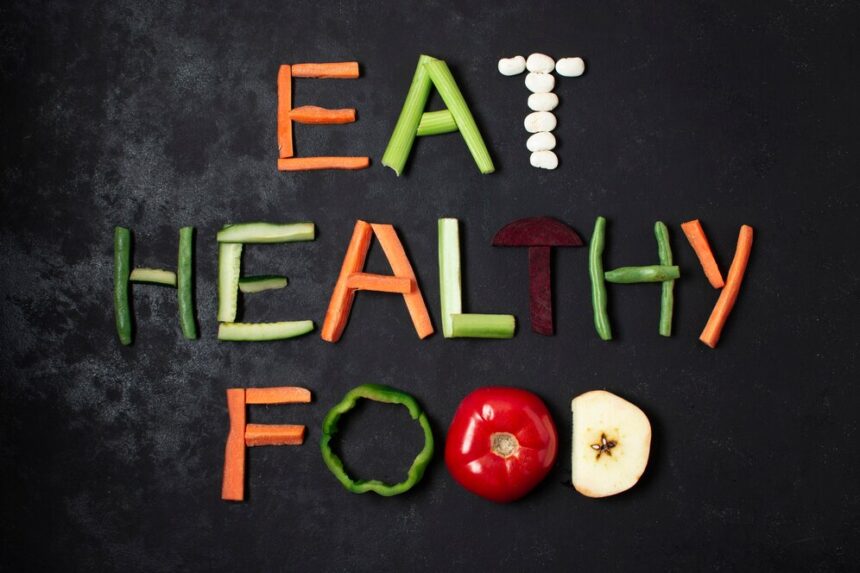image source: Freepik
Eating a balanced diet is essential for maintaining good health and overall well-being. It provides your body with the vital nutrients it needs to function optimally.
1. Understanding a Balanced Diet
A balanced diet consists of consuming foods in the right quantities from various food groups. It’s about getting the correct amount of nutrients – proteins, carbohydrates, fats, vitamins, and minerals – to function correctly. Eating a well-rounded diet ensures that your body gets the right amount of calories it requires without exceeding the limit. This balance is essential to avoid weight gain or loss and to keep your body functioning at its best.
2. The Five Food Groups
A balanced diet is composed of foods from five primary groups:
2.1 Vegetables and Legumes
Vegetables and legumes are packed with vitamins, minerals, and dietary fiber. You should aim for a variety of vegetables of different colors for a full range of nutrients. Dark leafy greens such as kale and spinach, red or orange vegetables like carrots, and white vegetables like cauliflower are excellent sources of essential vitamins and minerals.
2.2 Fruits
Fruits are a good source of vitamins, minerals, and dietary fiber. It’s advisable to consume fresh, frozen, or canned fruits regularly. However, when choosing canned fruits, opt for those packed in water or their own juice, not syrup.
2.3 Grains and Cereals
Whole grains and cereals should form a significant part of your diet. They contain essential nutrients, including dietary fiber that can help you feel full for longer, reducing the risk of overeating. Whole grains such as brown rice, whole wheat bread, and oatmeal are excellent choices.
2.4 Protein
Proteins are crucial for the body’s growth, repair, and maintenance. They can be found in foods such as lean meat, poultry, fish, eggs, legumes, tofu, nuts, and seeds. Oily fish such as salmon and mackerel are particularly beneficial as they are high in omega-3 fats, which can help prevent heart disease.
2.5 Dairy
Dairy products provide essential nutrients including protein, calcium, and vitamin D. It’s recommended to choose low-fat or fat-free options whenever possible. For those following a vegan diet or who are lactose intolerant, fortified plant-based milks and dairy alternatives can be excellent sources of these nutrients.
3. Importance of Balanced Diet
A well-rounded diet provides numerous health benefits. It not only gives your body the nutrients it needs to function correctly but also helps prevent chronic diseases like obesity, heart disease, diabetes, and even certain types of cancer. It’s also crucial for maintaining a healthy weight, boosting your immune system, and promoting good mental health.
4. Understanding Calories
Calories refer to the amount of energy stored in food. Your body uses this energy for various functions such as breathing, thinking, and physical activity. The number of calories a person needs depends on factors like age, sex, and activity level.
5. Choosing a Balanced Diet
Choosing a balanced diet involves selecting a variety of foods from the five food groups. The goal is to consume nutrient-dense foods that provide the most nutritional value for the calories they contain. This means prioritizing whole foods like fruits, vegetables, lean proteins, whole grains, and dairy products over processed foods.
6. Foods to Avoid or Limit
Certain foods should be avoided or limited in a healthy diet. These include highly processed foods, refined grains, added sugars, red and processed meats, and foods high in saturated or trans fats. Consuming too much of these foods can lead to weight gain and an increased risk of chronic diseases.
7. The Role of Exercise
In addition to a balanced diet, regular physical activity is crucial for overall health. Exercise helps to maintain a healthy weight, boost mood, reduce stress, and prevent chronic diseases.
8. Importance of Hydration
Staying hydrated is as important as eating a balanced diet. Drinking plenty of fluids helps maintain the body’s fluid balance, aids digestion, transports nutrients, regulates body temperature, and keeps the skin looking good.
9. Avoid Skipping Meals
Skipping meals, especially breakfast, can lead to out-of-control hunger, often resulting in helpless overeating. Skipping meals can also cause your metabolism to slow down, which can cause weight gain or make it harder to lose weight.
10. Portion Control
Portion control is key in a balanced diet. Even healthy foods should be eaten in moderation. It’s important to balance the amount of food you eat with the amount of food your body uses up.
11. Mindful Eating
Mindful eating is about paying attention to what you’re eating and how it makes you feel. It’s about noticing the colors, smells, flavors, and textures of your food and recognizing the signals your body sends about taste, satisfaction, and fullness.
12. Consulting a Professional
If you’re unsure about what a balanced diet should look like for you, consider consulting a nutritionist or dietitian. They can provide dietary advice tailored to your individual health needs, food preferences, and lifestyle.
In conclusion, a balanced diet is crucial for good health and well-being. By eating a variety of nutrient-dense foods from all the food groups, maintaining portion control, and exercising regularly, you can maintain a healthy weight, reduce your risk of chronic diseases, and promote overall health. Remember, it’s not just about eating the right foods, but also about eating them in the right amounts and at the right times.


